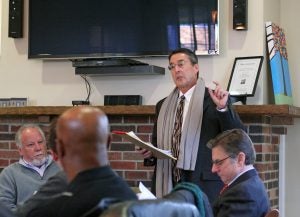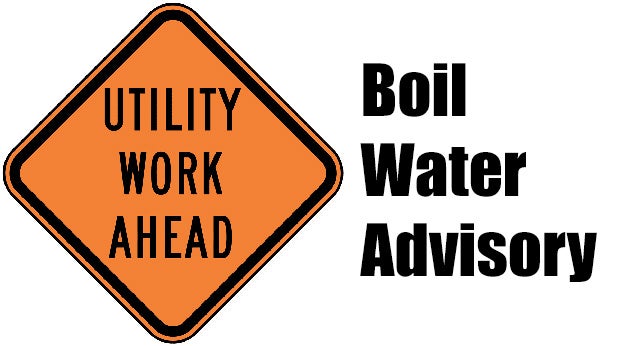Kinder Morgan ‘cancels’ NGL pipeline plan
Published 8:10 pm Wednesday, October 17, 2018

- The Tennessee Natural Gas Pipeline No. 1 crosses over Herrington Lake between Boyle and Garrard counties. (File photo by Ben Kleppinger)
A plan to repurpose 964 miles of natural gas pipeline to carry fracking byproducts has been canceled.
Houston-based energy giant Kinder Morgan “has determined that it will not proceed with its previously proposed Utica Marcellus Texas Pipeline (UMTP) natural gas liquids project, instead maintaining that segment of an existing (Tennessee Gas) pipeline in natural gas service, while developing an attractive project to reverse its flow,” according to Kinder Morgan’s third-quarter earnings statement, made public just after 4 p.m. Wednesday.
The statement goes on to say that Tennessee Gas, the Kinder Morgan-owned company that runs the pipeline, “is now actively pursuing commercial arrangements for natural gas service from Appalachia to the Gulf of Mexico on that segment of its pipeline.”
Kinder Morgan Director of Public Affairs Stephanie Kindregan sent an email to some people shortly after the earnings statement was issued, writing, “I wanted to make you aware that earlier today, Kinder Morgan announced that it is cancelling the Utica Marcellus Texas Pipeline (UMTP) project in favor of maintaining the pipeline in natural gas service.”
A Kinder Morgan spokesperson said Wednesday evening the company wouldn’t immediately have more information available or be able to comment beyond what was released in the earnings statement.
In Danville and Boyle County, Kentucky, local opposition to the plan was perhaps stronger than at any other point along the pipeline’s route through six states. Every government in Boyle County formally objected to the plan and a grassroots group calling itself Citizens Opposed to the Pipeline Conversion led vocal efforts against the plan.

Members of the group Citizens Opposed to the Pipeline Conversion meet at the Boyle County Public Library in February. (File photo by Ben Kleppinger)
“All I can say is it’s wonderful news,” said Sarah Vahlkamp a leader of the COPC group, which has been fighting the plan for around four years. “We just appreciate all the efforts that our community made and got behind. We can’t help but think that it made some difference.”
Mark Morgan is a local attorney who helped draft a zoning regulation that may have allowed Boyle County to block the pipeline plan locally if it ever got to an implementation phase.
He said the proposal to transport “natural gas liquids,” known as NGLs, would have threatened “our schools, our hospital, our drinking water supply, our prime farm land and many of the other resources in our community.”
“I can’t express how pleased I am, how overjoyed I am that it appears that we may have dodged this bullet,” Morgan said. “We’ll have to remain attentive and alert to future developments, but it appears that right now, we can appreciate how strong and effective our community is when we unite together.”
“This project was ill-conceived from the very beginning and the effective response from our community shows how powerful, how wonderful our community is when we are united,” Morgan said. “We came together regardless of political party, regardless of other values and became the leader in the state and in all six of the states affected by this proposed hazardous liquids pipeline. Credit goes to our city commission; our fiscal court; our Planning and Zoning Commission; our EDP; our Chamber of Commerce; our Convention and Visitors Bureau; Junction City Council; Perryville Council; the effective research and journalism from our local newspaper, The Advocate-Messenger; and the number of citizens that gave a huge amount of their time to raise awareness of the dangers of this project.”
Danville Mayor Mike Perros said Kinder Morgan’s announcement is “certainly welcome news.”
“But I wouldn’t turn my back on this chapter for good,” he cautioned. “In fact, if there’s anything we can do to further dissuade the federal government to ever consider this, I think we should do so.”
Perros said he believes Kinder Morgan canceled the project because oil prices aren’t as high as they once were.
“All of this is because the price of oil got to a high level that made the market attractive for such a thing,” he said. “Now that oil is at the level it is, it’s uneconomical for Kinder Morgan. That could very easily change in the coming years.”
Kinder Morgan is “one of the largest energy infrastructure companies in North America” and owns “an interest in or operates approximately 84,000 miles of pipelines and 152 terminals,” according to the company.
Kinder Morgan subsidiary Tennessee Gas Pipeline Company first applied to change the use of its Pipeline No. 1 in February 2015. Tennessee Gas wanted to “abandon in-place” the pipeline, meaning it would no longer be used to carry natural gas and the Federal Energy Regulatory Commission (FERC) would no longer regulate the pipeline’s contents.
Kinder Morgan’s plan was to then sell the pipeline to Utica Marcellus Texas Pipeline LLC, another of its subsidiaries. UMTP would have reversed the flow and used the pipeline to transport “natural gas liquids” (NGLs), byproducts of fracking in northeast shale fields, south to the gulf coast, where they could theoretically be sold for processing into plastics and other materials.
Opponents of the plan, including many public officials in Boyle County, warned the existing pipeline was built to handle natural gas, not heavier NGLs; that NGLs are far more explosive and damaging to the environment than natural gas; and that a leak in the pipeline could have devastating local consequences, such as the poisoning of Herrington Lake — the main potable water source for the region — or the creation of highly flammable, heavier-than-air clouds of gas that would pool at ground-level and could ignite from something as small as a car starting.

Mark Morgan provides an update regarding the Kinder Morgan Pipeline during a December 2017 Economic Development Partnership board meeting. (File photo by Kendra Peek)
Local attorney Morgan told officials previously he had been told that Kinder Morgan was surprised by the pushback in Kentucky.
“The fracking companies foresaw tremendous resistance if they tried to go to the eastern seaboard and reach a port that way … They anticipated, because of the education level, they would get more pushback,” he said previously.
Opponents filed public comments with FERC opposing the plan and fought for the completion of an “environmental impact study.” But FERC decided against an EIS and Tennessee Gas gained approval to abandon the pipeline on Sept. 29, 2017.
Tennessee Gas accepted FERC’s certificate to allow abandonment, but also delayed creating an “implementation plan” because of “uncertainty in market conditions,” according to a filing from the company in October 2017.
“Tennessee is working to confirm the degree of market interest in the project,” the filing states. “As a result, Tennessee is not in a position to prepare and file its implementation plan at this time.”
The company has since filed three quarterly status reports with the same statement about “uncertainty” in the market for NGLs.
After FERC approval, opponents saw their last line of defense as a zoning amendment passed in Boyle County in 2016. The amendment requires applicants wishing to move certain hazardous materials through pipelines in the county to first obtain a conditional use permit from the local Board of Adjustments. The zoning amendment was held up as unique in the U.S. and a model that other communities along the route of the pipeline could use to similarly block Kinder Morgan’s plan.

Boyle County resident Tom Ellis asks his elected representatives to support resolutions opposing a plan to repurpose a natural gas pipeline that runs through Boyle County and over Herrington Lake. (File photo by Ben Kleppinger)
In March of this year, the Kentucky Senate passed a resolution stating “concerns” about the pipeline plan and asking that “any future repurposing practices be approached in the most environmentally and socially responsible way.” The resolution was sponsored by Boyle County’s state Sen. Rick Girdler (R-Somerset), who said he was informed on the matter by Boyle County resident Tom Ellis.
Mayor Perros said it was efforts of “early responders” in Boyle County and Danville that served as a spark to get others involved in opposing the plan.
“They educated all of us, when we didn’t even know this was being proposed. It’s taken a long time for others to catch on to the situation and Mark (Morgan) and the others have been relentless in beating a drum on this thing. And that’s what it’s taken,” Perros said. “They clearly took the lead on this issue and other counties finally got on board, and hopefully, that’s the reason that Kinder Morgan backed off.
“In matters like this, you really ought not to mess with Danville and Boyle County. People can get active on issues like this. It’s another wonderful characteristic of our community.”





